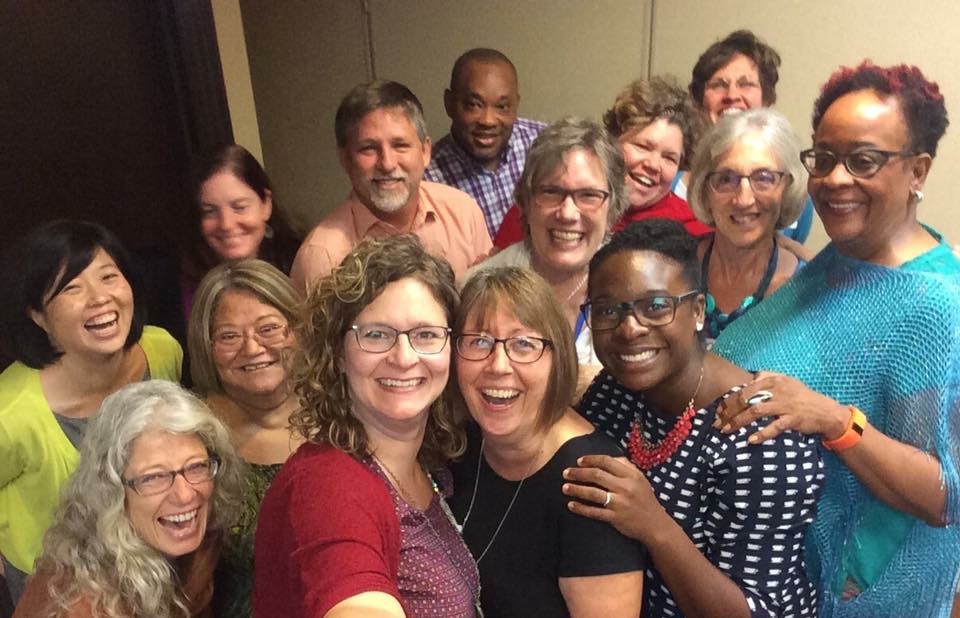IDI now available throughout the church
By Jenny Castro

Intercultural Development Inventory-qualified administrators met Aug. 9–11 in Kansas City, Missouri (l. to r.): (front) Elaine Enns, Karin Kaufman Wall, Lorraine Stutzman Amstutz, Chantelle Todman Moore, Michelle Armster; (second row) Sue Park-Hur, Iris de León-Hartshorn, Jan Ellen Reid, Ruth Yoder Wenger; (third row) Susannah Lepley, Darin Short, Linda Herr; (fourth row) Glen Alexander Guyton, Shana Boshart. (Not pictured: Carlos Romero, Rachel Stoltzfus) (Photo provided)
(Mennonite Church USA) — Sixteen qualified administrators of the Intercultural Development Inventory (IDI) from across Mennonite Church USA gathered for the first time Aug. 9–11 in Kansas City, Missouri.
According to Iris de León-Hartshorn, director of transformative peacemaking for Mennonite Church USA, the IDI is an assessment tool that measures the intercultural competence of individuals, groups and organizations. Intercultural competence is the ability to engage effectively and appropriately with people of other cultures. An IDI-qualified administrator, de León-Hartshorn has been using the IDI with area conferences and Mennonite Church USA institutions since 2012.
“The learnings of intercultural competency show that until people are able to see differences and commonalities among them, it is very hard for them to recognize power and privilege,” she says. “Developing intercultural competency helps people move to a place where they can better see and understand racism within their context.”
Throughout the last year, Mennonite Church USA’s Executive Board staff provided 10 scholarships for people across the church to be trained to administer the IDI.
“We intentionally awarded scholarships to people in different regions,” de León-Hartshorn said, “so that churches, area conferences and other organizations would have access to qualified administrators closer to them.”
De León-Hartshorn says that IDI administrators participate in a course that explores the various levels (theory and practice) of intercultural competency. Qualified administrators are not only certified to administer the IDI, but also to provide feedback to individuals and organizations working to improve their intercultural competence.
“The IDI can empower our congregations, area conferences and institutions,” she says. “What are the things we have in common and the things that are different among us? We have to find ways to navigate our differences and still be church together. If we want to show the world a different way of being — working with our differences — the IDI can give us the skills to be able to do that.”
The meeting, which included IDI administrators from Mennonite Central Committee and Eastern Mennonite University, Harrisonburg, Virginia, as well as independent consultants, provided Mennonite IDI administrators the opportunity to connect with one another and resource each other. De León-Hartshorn plans to hold annual gatherings for the IDI administrators over the next two to three years — and eventually biennially — for networking and equipping.
“We gained tangible resources — a PowerPoint template, intercultural games and activities and more — that we can use right away and tailor specifically to Mennonite Church USA congregations and agencies we serve,” says Sue Park-Hur of Pasadena, California, an IDI-qualified administrator who participated in the KC event. “We also got to know each other and built trust, recognizing that we are not working alone but as part of a great team.”
IDI trainings are available to all Mennonite Church USA conferences; the following conferences have IDI-qualified administrators within their region: Atlantic Coast Conference, Central District Conference, Central Plains Mennonite Conference, Indiana-Michigan Mennonite Conference, Mountain States Mennonite Conference, Pacific Northwest Conference, Pacific Southwest Mennonite Conference, Virginia Mennonite Conference and Western District Conference.
A complete listing of IDI-qualified administrators as well as a fee schedule will be available on the Mennonite Church USA website in mid-September; see http://mennoniteusa.org/what-we-do/undoing-racism/intercultural-development-inventory/.
###
Image available:
Intercultual_Development_Inventory_administrators_Aug_2016_0578.jpg
Intercultural Development Inventory-qualified administrators met Aug. 9–11 in Kansas City, Missouri (l. to r.): (front) Elaine Enns, Karin Kaufman Wall, Lorraine Stutzman Amstutz, Chantelle Todman Moore, Michelle Armster; (second row) Sue Park-Hur, Iris de León-Hartshorn, Jan Ellen Reid, Ruth Yoder Wenger; (third row) Susannah Lepley, Darin Short, Linda Herr; (fourth row) Glen Alexander Guyton, Shana Boshart. (Not pictured: Carlos Romero, Rachel Stoltzfus) (Photo provided)

